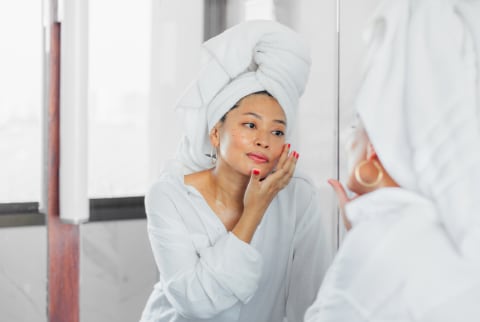
Assistant Beauty & Health Editor
Assistant Beauty & Health Editor
Hannah Frye is the Assistant Beauty Editor at mindbodygreen. She has a B.S. in journalism and a minor in women’s, gender, and queer studies from California Polytechnic State University, San Luis Obispo. Hannah has written across lifestyle sections including health, wellness, sustainability, personal development, and more.

Image by Studio Firma / Stocksy
October 6, 2023
We carefully vet all products and services featured on mindbodygreen using our
Our selections are never influenced by the commissions earned from our links.
Much of how your skin ages comes down to genetics, but you do have control to some extent. From sun exposure to nutrition to topical products and beyond, there are a plethora of factors that are in your control. This means if you’re intentional, you may just be able to encourage tighter, healthier skin 20 or 30 years out—but it’s all about consistency.
If you’re chasing healthy skin aging, consider starting these habits in your 30s (or even before) for stronger skin down the line.
First up, microcurrent treatments. You can get a microcurrent facial to reap these benefits or invest in an at-home microcurrent tool;the latter may be more cost-effective if you plan on keeping this ritual around.
“Microcurrent is a very tiny electrical current that mimics your body’s own natural pulses. What that means is our brains use currents to communicate through our neurological pathways, where it’s constantly sending signals. What we’re doing with this technology is mimicking those currents and delivering them to our facial muscles,” says biomedical engineer and holistic skin care expert Pooja Johari, M.S., founder of 7E Wellness. These pulses, she notes, stimulate our muscles to act younger. “The thing is, the facial muscles can’t tell whether the signal is coming from the brain or this device.”
It also works by stimulating and strengthening the muscles. “It stimulates the facial muscles underneath the skin, which will help to improve the facial contour, tone the skin, and reduce wrinkles,” says celebrity esthetician Shani Darden about microcurrent facials.
And you don’t have to wait for wrinkles to show up to use these tools. “Microcurrent devices are best utilized for prevention and maintenance and therefore can be started as early as your 20s,” board-certified dermatologist Rebecca Marcus, M.D. previously told mbg.
See, you lose 1% of collagen per year starting in your mid-20s, which can manifest in fine lines and sagging skin over time. So the sooner the better for collagen support.
RELATED: ZIIP Vs NuFace: What Is The Better Microcurrent Device? We Tried Them Both
3.
A consistent topical routine
Some of the best ingredients for healthy skin aging are retinol, peptides, and, of course, sunscreen. But no matter how great your product lineup may be, those serums and creams won’t do much if you aren’t consistent.
While it’s fair to switch up your routine every once in a while, you should give your products time to work before calling it quits. Retinol, for example, can take several weeks and even months to procure results for some people. Other ingredients, like vitamin C and glycolic acid, may help alleviate hyperpigmentation and support an even skin tone, but they don’t work overnight.
Your topical routine can be a powerful tool for keeping your skin tight, hydrated, and healthy, but you have to commit to the process to see and feel peak results.
RELATED: The Best Anti-Aging Skin Care Routine + Dermatologist Tips & Product Recommendations
The takeaway
How your skin ages is partly genetic and partly determined by your at-home care. Three steps you can take to keep your skin taut are investing in microcurrent tools (our favorites here), collagen supplements (like these picks), and staying consistent with your home care routine. Also, remember that there’s nothing wrong with visibly skin aging—it happens to us all, even when treated with the utmost care. If you’re happy in your skin, that’s all that matters.
